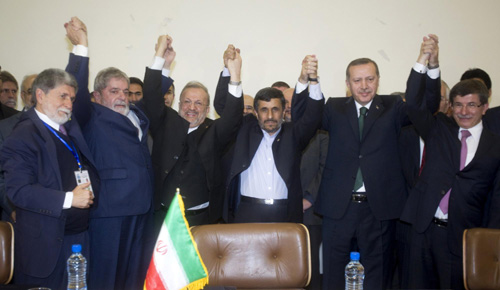Global General
Iran to ship uranium to Turkey in nuclear deal
(Agencies)
Updated: 2010-05-17 16:23
 |
Large Medium Small |

The deal aims to revive a plan drafted by the UN in October that was ultimately rejected by Iran after some initial mixed signals. Many of the details appear to be the same.
Iran will ship most of its enriched uranium - about 2,600 pounds, or 1,200 kilograms - to Turkey to trade it for fuel rods containing uranium enriched to higher levels needed for the research reactor, Mehmanparast said.
That process would begin one month after a final deal is signed between Iran and its main negotiating partners, including the United States and the UN's nuclear watchdog, the International Atomic Energy Agency.
Iran appears to have dropped an earlier demand for the fuel exchange to happen in stages, rather than providing its material in a single batch. It also dropped an insistence that the exchange happen inside Iran as well as a request to receive the fuel rods at the same moment.
The UN draft has a gap of about a year to allow time for the rods to be manufactured in France.
While kept under international supervision in Turkey, the uranium would still be considered Iranian property until Iran receives the fuel rods, Foreign Minister Manouchehr Mottaki said.
Iran first reached out to Turkey and Brazil in its efforts to avoid tougher UN sanctions for its refusal to stop enriching uranium altogether. Both countries are non-permanent members of the Security Council.
Iran says its enrichment program is only for peaceful uses, such as producing fuel for nuclear power plants.
Mehmanparast said a letter will be sent to the IAEA within a week to pave the way for a final agreement.
"Should they be ready, an agreement will be signed between us and the group," he said, referring to the US, France, Russia and the IAEA.
A month later, the uranium - currently enriched to a level of 3.5 percent - would be sent to Turkey, where it would be stored under IAEA and Iranian supervision, Mehmanparast said. The fuel rods would contain material processed to just under 20 percent.
Enrichment of 90 percent is needed to produce material for nuclear warheads.






